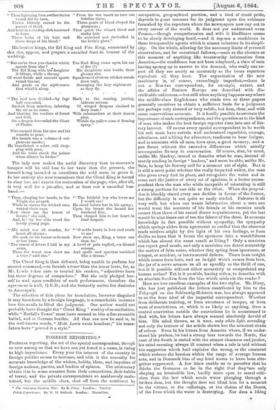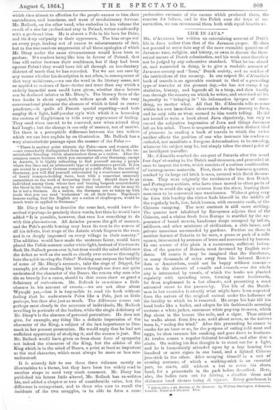FOREIGN REPORTING.* POLITICAL reporting, the art of the special correspondent,
though so new among us that we have not yet found it a name, is rising to high importance. Every year the interest of the country in foreign politics seems to increase, and with it the necessity for accurate knowledge of the wishes, habits, ideas, and impulses of foreign nations, parties, and leaders of opinion. The aristocracy obtain this in some measure from their connections, their habits of travel, and the private correspondence so assiduously main- tained, but the middle class, shut off from the continent by
• The Schleswig-Ha:stela War. By B. Dicey. London : Tinsley. Polish Experiences. By W. H. Bullock. London: Macmillan.. occupation, geographical position, and a kind of timid pride, depends in great measure for its judgment upon the evidence furnished by the reporters whom the newspapers now ray out -to every corner of the world. It does -not yet understand even France,—though comprehension and with it kindliness seems to be slowly developing itself,—and it repairs a confidence in these irresponsible agents which is almost infantine in its simpli- city. On the whole, allowing for the necessary limits of personal observation, and for occasional failures,—such as the absence,at this moment of anything like trustworthy information from America,—the confidence has not been misplaced, 'a class of men having sprung up in answer to the demand, who really Caa:ye- port all they see nearly as accurately as the home reporters' reproduce all they hear. The organization of the new machinery is, of course, exceedingly imperfect,—there
not a Russian correspondent, for example, extant, and the affairs of Eastern Europe are described with dis- creditable unfairness,—but still when anything happens anywhere the middle-class Englishman who reads two or three papers generally contrives to obtain a sufficient basis for a judgment not perhaps very shrewd or very subtle, but firm, clear, and with some reservations accurate. It is hardly possible to overrate the importance of such correspondence, and the questionus to the kind of man who makes the best foreign reporter rises into one of lite- rary interest. Of course every special correspondent to be worth his salt must have certain well understood capacities, courage, adroitness, and a liking for adventure, readiness to bear fatigue, and to associate with all men, keen eyes, a good memory, and e pen fluent without the excessive diffuseness which usually accompanies fluency in conversation. Of course, also, be must, unlike Mr. Mackay, intend to describe what he sees, instead of merely sending in foreign "leaders," and must be able, unlike Mr. Sala, to keep his literary self for a moment out of eight. "But it is still a moot point whether the really impartial writer, the man who gives every fact its place, and recognizes the value and in some sort the justice of every set of opinions, is a better corres- pondent than the man who while incapable of misstating is still a strong partizan for one side or the other. When the proposi- tion is blankly stated every one decides in favour of the former, but the difficulty is not quite so easily settled. Fairness is all very well, but when one wants information about a man one would trust the accounts of his friends or his enemies much sooner than those of his casual dinner acquaintances, yet the last would be nine times out of ten the fairest of the three. Is accurate knowledge in fact possible without sympathy, the sympathy which springs either from agreement so cordial that the observer reads motives aright by the light of his own feelings, or from dislike so keen that it forces the spectator into a watchfulness which has almost the same result as liking? Only a musician can report good music, and only a musician can detect accurately the motive of false notes, whether they spring from ignorance, or temper, or accident, or instrumental defects. There is an insight which comes from hate, and an insight which comes from love, the jar of a nerve arouses us all as speedily as the thrill of one, but is it possible without either accurately to comprehend any human action? Yet is it possible, having either, to describe with an absolute freedom fram the bias which misleads the reader ?
Here are two excellent examples of the two styles. Mr. Dicey, who has just published the letters contributed by him to the Telegraph on the Schleswig-Holstein war, has always appeared to us the beau ideal of the impartial correspondent. Whether from deliberate training, or from sweetness of temper, or from want of convictions, or, which is as likely as anything, from a central conviction outside the convictions he is accustomed to deal with, his letters have always seemed absolutely devoid of bias. His mind throws, as it were, only white light, revealing not only the texture of the article shown but the minutest shade of colour. Even in his letters from America where, if we under- stand his preface, lie had a strong bias towards the North, the case of the South is stated with the utmost clearness and justice, his mind seeming always ill content when a tale is told without the suggestion which half explains the wrong, or the comment which reduces the heroism within the range of average human acts, and in Denmark bias of any kind seems to have been alto- gether suppressed. A few hints enable us to perceive that he thinks the Germans so far in the right that therare only obeying an irresistible law, hardly more open to moral criti- cism than the law which sends water plunging through a broken dam, but the thought does not blind him for a moment to the virtues, or the sufferings, or the claims of the Danes, of the lives which the water is destroying. Nor does a liking which rises almost to affection for the people excuse to him their unreadiness, and heaviness, and want of revolutionary fervour.
Mr. Bullock, on the other hand, who embodies in his volume the result of a sinflar professional stay in Poland, writes confessedly with A profound bias. He is almost a Pole in his love for Poles,
and his deep antipathy to their oppressors. The bias crops out on every page, leading not of course to misstatements of fact, but to the unconscious suppression of all those apologies of which Mr. Dicey under the same circumstances would have been so profuse. His readers being like him in favour of Poland, that bias will rather increase their confidence, but if they had been against Poland they would have felt all through an involuntary distrust of much that he has recorded. Yet we are not sure by any means whether his description is not often, in consequence of that very unfairness,—we use the word in its literary sense, not as applied to matters of fact—better and truer than any which a :strictly impartial man could have given, whether these letters can be declared inferior to Mr. Dicey's. The literary force of the two books is about equal, both writers speak with the easy conversational plainness the absence of which is fatal to corres- poudence,—it spoils all French special reporting—and both employ thet light, half-jocular style with which it is becoming the custom of Englishmen to bide every appearance of feeling. 'They used when moved to be reserved, now when stirred they half laugh ; but the change is one only of manner, not of motive. Yet there is a perceptible difference between the two writers which we can best explain by an illustration. Mr. Bullock has a very characteristic passage upon the manner of the Poles :—
" There is another point wherein the Poles—men and women alike —are remarkably distinguished from the Germans, and that is, the un- mistakable breeding which characterizes them as a nation. After the common coarse features which you encounter all over Germany, except in Austria, it is highly refreshing to find yourself among a people where fine lines and an aristocratic type of countenance prevaiL If you are seated in a purely German company at a table d'hote in the north of -Germany, you will find yourself surrounded by a wearisome monotony .of heavy common-looking faces, bent with a somewhat unseemly earnestness on the work of devouring their food. Should there be an individual among them whose face and bearing bespeak unmistakably the blood in his veins, you may be sure that whatever else he may be he is not a German. As a nation, the Germans are so taken up with -trade that you can read 'tradesman' on all their faces. Napoleon's famous saying, that the English are a nation of shopkeepers, would be much truer as applied to Germans."
Mr. Dicey having to describe the same fact, would have de- scribed it perhaps in precisely those words, but then he would have added "It is possible, however, that race has something to do with this pleasantness. All Asiatics possess the gift of manner, and the Pole's gentle bearing may have its root in the source of all his defects, that tinge of the Asiatic which lingers in the race, and is so deeply impressed on every village in their country." The addition would have made the sentence fairer, would have placed the Polish manner under white light, instead of the roseate
flush Mr. Bullock pours over it, but then would the mind which sees the defect as well RS the merit so clearly ever enter so thoroughly into the spirit moving the Poles? Nothing can surpass the lucidity of some of Mr. Dicey's accounts, take the siege of Diippel, for example, yet after reading his letters through one does not quite understand the character of the Danes, the reason why men who -die so bravely for a cause, should in that cause show so great a 'deficiency of enthusiasm. Mr. Bullock is sometimes a little 'obscure in his account of events,—we are not clear about 3V'yso9ki yet,—but it is impossible to read his book without feeling that he understands Poles like a Pole, just as little perhaps, but then also just as much. The difference comes out perhaps most clearly in the aceounts of individuals, Mr. Bullock
eevelling in portraits of the leaders, while the single deficiency of Mr. Dicey's is the absence of personal portraiture. He does not give, for example, any thing like a definite impreission of the character of the King, a subject of the last importance to Den- markin her present prostration. He would reply that he had not sufficient opportunity of studying it, and the excuse is just. But Mr. Bullock would have given us from sheer force of sympathy
not indeed the character of the King, but the eidolon of the King which is in the mind of Danes, a point at least as important as the real character, which must always be more or less mis- understood.
It is sc.arcely fair to use these three volumes merely as
illustrati6ns to a theme, but they have been too widely read in another shape to need very much comment. Mr. Dicey has published his letters little altered, Mr. Bullock has re-written his, and added a chapter or two of considerable value, but the difference is unimportant, and to those who care to recall the incidents of the two struggles, to be able to form a com- prehensive estimate of the causes which produced them, the reasons for failure, and in the Polish case the hope of re- surrection, we can recommend them both with equal beartiu:s=.































 Previous page
Previous page